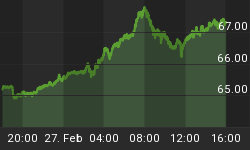The Organization for Economic Cooperation and Development (OECD) is warning that the U.S. current account deficit will hit $900 billion or 6.7 percent of U.S. gross domestic product in 2006. These very large numbers are caused by a continued reinforcement of global imbalances: on the one hand, a very low U.S. savings rate, high U.S. consumption fostered by very low interest rates, and cheap Asian goods flooding the U.S. market (cheap because Asia subsidizes their exports through low exchange rates). On the other hand, we have lackluster demand in Europe and some Asian countries, notably Japan. OECD chief economist Jean-Philippe Cotis told the Financial Times: "We are not saying there will be a doomsday tomorrow morning ... but because the adjustments [to global imbalances] are relatively slow, we are running the risk that an accident will happen. [..] Time is running out - the numbers are getting big, big, big."
As pressure has mounted on China to revalue their currency, China has instead opted to impose export tariffs on select textiles and other goods. For China, this path of appeasing Western complaints about dumping their markets has the advantage that they do not have to devalue their massive currency reserves, that the Chinese government increases tax revenue, and that they can micro-manage their economy. Whether this is enough to counter the momentum of blaming China for all that is wrong with the global imbalances remains to be seen. As we have mentioned before, while China is yielding in the textile battle, China is winning the high-tech war: China recently introduced legislation to require foreign companies supplying high technology products to the government to have China based research and development.
Europe will not suddenly switch to a supply-side stimulus. The most notable event recently in Europe was Germany's calling of early elections in the fall. No matter who wins this election, this is a welcome boost to the European reform agenda: Schroeder's government had become a lame duck government, and all major political parties agree that reforms must take place. A new election will give a fresh mandate; we expect that this will accelerate reforms in Germany.
This weekend, the French are voting on whether to accept the new EU constitution. While a French no-vote would be a major disappointment for EU politicians, it would not be the end of the European Union. It would be a stark reminder to European politicians that politics must involve communication with its citizens. Europe has implemented many reforms with its current structure, and while a passing of the constitution is with no doubt helpful, Europe will have to find its way no matter what. Given that numerous governments in Europe are in politically weak positions, allowing for a fresh set of politicians to look at the constitution may cause a significant delay; opponents to the new EU constitution argue that such a delay is not the end of the world.
In the U.S., Greenspan now openly uses the "bubble" word when referring to the U.S. housing market. This late admission is in line with his sluggish reaction to the "irrational exuberance" he had noted in the stock market a few years ago. The U.S. economy is too leveraged to allow the Fed to forcefully act against. However, any delays will make the adjustment process only more severe. The housing bubble is a direct result of the highly accommodating monetary policy.
I was invited to comment on CNBC last week on the Treasury Department's currency report. While the U.S. blames China for subsidizing their currency, we tend to forget that U.S. subsidizes its own economy with their own set of tools. Fostering a low U.S. savings rate and excessive consumption is as much a factor to the global imbalances as a currency peg by China. Now, as we are approaching a $900 billion dollar current account deficit, we believe that it becomes increasingly likely that the markets will force an adjustment in the global imbalances.
Such an adjustment may include a global flight out of the dollar, higher interest rates and a collapse in U.S. housing prices.















